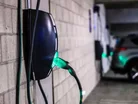Manufacturing with 2020 vision: Environment and Sustainability

Electric vehicles and water conservation will be at the epicentre of progress for manufacturers over the coming year.
Some dreams take time to come true, especially if they amount to the most profound transformation we have seen since the industrial revolution. As manufacturers adapt and evolve to an ever connected and green(er) world, here are two main trends we can expect to see in 2020.
Don’t hold me now – the rise of electric vehicles
To herald the arrival of electric vehicles may seem surprising - after all, they have been produced and available for many years already. However, both the public and businesses have been rather slow to adopt and embrace the technology. The hope is that this could be about to change, and electric vehicles - and all related infrastructure - are set for a big year in 2020.
The reason for the slow uptake so far is the wholesale shift in consumer attitudes that is required to move people towards adopting electric vehicles, which in this case largely revolves around battery life. The perception remains that electric vehicles have limited - and consequently limiting - range to their batteries, and that charging them is a time-consuming burden for the pace of modern life and therefore inconvenient.
However, this issue is being increasingly addressed. BP recently installed the first ultra-fast charging point in London, one of 400 being fitted across the country over the next two years. These charging points offer 150kW pods – which can supposedly deliver around 100-miles of range in just 10 minutes. There is hope that where industry giants lead the way by focusing on improving charging availability and convenience, consumer attitudes to electric vehicles will change.
Developing batteries with a longer life is a challenge that is spurring innovation. This is a crucial but pricey component of any electric vehicle, and the key to unlocking the potential of this whole concept. If we are to see a breakthrough this year, governments around the world have a key role to play in continuing to encourage the development of the technology. In turn, we could see the combination of innovation, infrastructure and consumer attitudes all quickly align and a radical shift towards the widespread embrace of electric vehicles.
SEE ALSO:
Volvo commits to solely launching electrified vehicles
Porsche announces most powerful E-Performance vehicle yet
Groasis's Waterboxx® technology explained
Read the November issue of CSO Magazine here
Green is the new black
In 2020, environmental issues will continue to be at the top of everyone’s agenda when it comes to manufacturing. While the aforementioned electric vehicles will have a long-term impact once widely adopted, particularly in reducing the usage of fossil fuels, there are immediate steps that can and should be taken.
Primarily, water conservation will be seen as a crucial issue, in 2020 and beyond. Manufacturing is not unique as an industry in its high-water usage and this needs to be addressed, for business as well as environmental reasons.
It is not cheap to get through the industrial levels of water that manufacturing requires and finding internal methods to recycle will only grow as a priority.
Companies should now be targeting ‘circular innovation’, comprising desirability, viability, feasibility and, crucially, sustainability.
Climate changes have brought increases in extremes, with both water shortages and flooding growing in occurrence. This has left water utilities navigating an unsteady path to transformation; putting a strain on manufacturers, who rely on water for their production lines. The more volatile, and potentially expensive, this is, the more damage it can do to a business, before the ethical and environmental impact of water wastage is even considered.
Sustainability will become a key pillar of manufacturing in 2020, and this can start with water. While the water utilities work to improve their processes, companies individually can make great advances in their water conservation and recycling.
Prasad Satyavolu is Chief Digital Officer of Manufacturing and Logistics at Cognizant

